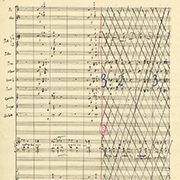Bohuslav Martinů composed his “Polní mše” (“Field Mass”) in exile in Paris
This popular work for male voices and ensemble has now been published in an authoritative edition.
Bohuslav Martinů began work on his Field Mass (Polní mše), H 279, a cantata for solo baritone, male voices, wind, harmonium, piano and percussion in autumn 1939 in Vieux-Moulin, and completed it in November that year in Paris. He set a text by Jiří Mucha written for this cantata. It contains excerpts from the Bible and sections from the mass ordinary: the Lord’s Prayer is at the beginning, and some psalms at the end. Jiří Mucha worked at this time as the Paris correspondent of the daily paper Lidové noviny and belonged with Martinů to a group of emigrants with a very strong sense of solidarity. Both were actively involved in the Czechoslovakian resistance in France and organised various politically-oriented cultural events.
Mucha was also editor of the Československý boj, a magazine published in Paris, to which Martinů contributed an article entitled “Pozdrav domovu” published on 4 November 1939. In this, he gave a deeper insight into his intentions with the Field Mass: “I must admit, this is actually not a mass at all, it is more a kind of prayer for the native country and about the sense of longing for it, which I have conveyed in music for us all, and as we have no cathedral nor any church or anything to use instead, we met in the field, like workers, soldiers, in the field where everywhere, above us, around us, there is a wide space, where people understand each other better, where they are more human than anywhere else. It is a prayer for male voices, accompanied by trumpets and drums, military signals and a march of the drums, but despite that it is peaceful, full of hope and belief in the future.”
The Field Mass was not premiered until after the Second World War, on 28 February 1946 in Prague, in a performance by the Czech Philharmonic and the Czech Radio Choir conducted by Rafael Kubelík. The composer was not present. The work was published by the Prague publisher Melantrich in 1947. In 1949 the composition was performed at Princeton University, where Bohuslav Martinů taught for several years. For this occasion, the existing English translation by Jiří Mucha’s wife, Geraldine Thomsen, was revised. This had probably been prepared for the Melantrich edition (which was originally published with the incorrectly-translated title “Military Mass”). The work soon became popular and received many further performances during the composer’s lifetime. For example, it was often performed by the Dutch ensemble “Die Haghe Sanghers”.
The new Urtext edition is based on the volume of the Bohuslav Martinů Complete Edition, and offers a new critical edition of the work, based on a study of all the available sources. In addition to the musical text, it includes the original ending of the composition, never published before, with the text of a Czech sacred song from the 14th century, “Jezu Kriste štědrý kněže” (Jesus Christ, sacred priest). Martinů altered this concluding passage immediately after completing the Field Mass in December 1939.
Jitka Zichová
(from [t]akte 1/2020 – translation: Elizabeth Robinson)



